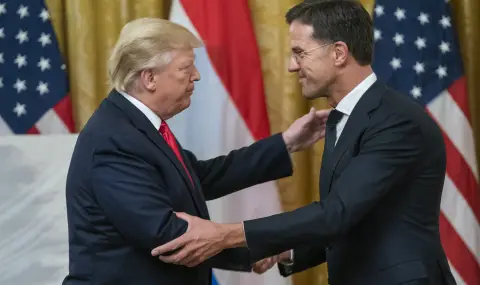Mark Rutte's message to Donald Trump was clear. The new NATO Secretary General was one of the first to congratulate Trump on his election victory. "I look forward to working with him again to enforce peace through force with the help of NATO," Rutte said. Then he quickly emphasized that in NATO Washington has 31 allies and friends who "will help enforce American interests, increase American power and ensure the safety of Americans". All of this is a clear reminder to Washington and what the US stands to gain if it remains loyal to the union.
Will Trump listen to those who understand him
Rutte is considered one of the European leaders who knows how to deal with Trump and how to brush his ego. As prime minister of the Netherlands, he managed to dissuade Trump from scuppering the NATO summit in the summer of 2018 by praising the US president's role in pushing all allies to spend more on defense.
Two-thirds of NATO countries currently spend at least 2 percent of their gross domestic product on defense, and the trend is upward across the Alliance.
How does Trump approach NATO?
However, it is not clear whether this will be enough for Donald Trump and how successful such a strategy will be this time. Trump has repeatedly made it clear that he sees no point in the Alliance per se. His attitude towards NATO is more transactional - he focuses on achieving short-term goals.
During his campaign, Trump indicated that he would remain part of the Alliance as long as European countries "play fair" and stop "taking advantage" from the US defense budget. It seems unlikely that Trump will pull the US out of NATO entirely, but there are many ways he could derail the alliance. It can, for example, withdraw its forces from military command, as France did in 1966.
The Trump administration could "make life in NATO very difficult because this organization decides everything by consensus," says Ian Lesser of the German "Marshall Fund" - transatlantic think tank.
Will Trump shake up NATO?
According to Lesser, if NATO's biggest partner "disagrees with something or has eccentric views, managing relations in the alliance will be very, very difficult". This is a big problem, especially now that Europe is at war.
Trump promised to end Russia's war in Ukraine within 24 hours. Many in Europe fear he may cut a deal with Russian leader Vladimir Putin at the expense of Ukraine, or at least reduce American support for Kiev. Trump could cut arms supplies to Ukraine or "instruct the U.S. military and intelligence services to stop sharing intelligence with Ukraine," said Jacob Kierkegaard, a senior fellow at the Bruegel think tank. This could have huge implications for Ukraine's military effort.
Can Europe fill the gaps?
US aid to Ukraine is critical, Stephen Blockmans said. The senior fellow at the Center for European Policy Studies in Brussels pointed out that Europeans cannot replace this support. "Despite all the talk in Europe about creating greater strategic autonomy," says Blochmans, "in reality, dependence on the US has grown - both in terms of security and trade."
A potential trade war with the US is certainly another source of concern for Europeans, given that during the election campaign Trump threatened to impose tariffs on all goods imported from abroad.
Demand for more European sovereignty
Could the outcome of the US election become a catalyst for more autonomy and unity? French President Emmanuel Macron seems to believe so. After the US elections, Macron said that together with German Chancellor Olaf Scholz they wanted to "work for a more united, stronger and more sovereign Europe in this new context".
Many in the European Parliament seem to agree with this. "We really need to invest in Europe's competitiveness, industrial and technological sovereignty," says Sven Mikser, former Estonian foreign minister and now MEP. "We really have to be serious."
Populists in Europe feel empowered by Trump
However, experts are skeptical. "It's one thing to talk about strategic autonomy in terms of future goals," says Ian Lesser. "It is quite another thing to put it into practice. It has to do with rebuilding European defense capacity in a way that could take many years."
The new discussion about more European sovereignty comes at a time when the continent is struggling with economic instability, declining competitiveness and, among other things, the rise of right-wing nationalism. Unsurprisingly, the continent's populist nationalist parties, boosted by recent European and national elections, see no need for more autonomy. Trump's victory may not have shocked Europe. But, as Steven Blockmans noted, that doesn't mean "it won't be a chaotic period.
